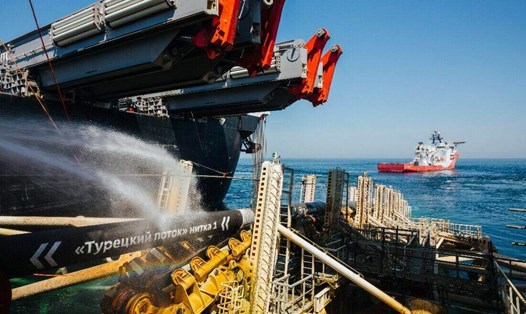Turkey reaffirmed its commitment to maintaining energy ties with Russia, rejecting the US's call to cut Russia off from its gas supply network.
Turkish Energy Minister Alparslan Bayraktar stressed that existing contracts and technical dependence make a sudden Russian gas cut off impossible.
"We cannot tell the people: We are out of gas," said Alparslan Bayraktar, noting that Turkey must ensure continuous supply from Russia, Azerbaijan, Turkmenistan and other sources during the winter.
He affirmed that Turkey will not abandon gas agreements with Russia despite calls from the US. He pointed out that the decision is related to infrastructure: Turkey's refineries were previously designed to handle input sources in the region, making purchases from Russia an essential need for trade and engineering.
Turkey remains heavily dependent on Russia for gas demand, with supplies from Russia accounting for more than 40% of imports.
Turkey has pursued diversification through LNG agreements with the US, Algeria and Oman. Turkey is also negotiating with ExxonMobil on a long-term LNG supply contract, which could provide up to 2.5 million tons per year, meeting about 7% of the country's gas demand. However, these efforts will not compensate for the volume of Russian gas.
In response to sanctions targeting Russia's Gazprombank - a bank that supports gas trade payments, the US has granted Turkey an extension of a until May exemption, allowing Turkey to continue paying to Russia despite US sanctions.
Analysts point to Turkey's fragile balance: On the one hand, political pressure from Washington and its Western allies; on the other hand, domestic demand, financial constraints and infrastructure requirements for stable gas flows.
Turkey's LNG imports in the spot market have increased, but the higher cost makes it not feasible to use LNG as a large-scale replacement.
For its part, Russia still wants to keep Turkey a customer. Russia has taken advantage of gas exports as an economic and geopolitical lever. Turkey's refusal to cut off gas ties with Russia could reaffirm Russia's confidence in the country's ability to recover energy ties outside of European customers.
However, Turkey is also monitoring the changing energy situation in the Black Sea, in which Turkey's gas production is expected to increase in the coming years.
Turkey expects the increase in domestic gas production to reduce dependence on imports to some extent, although that transition will take place gradually, not immediately.








